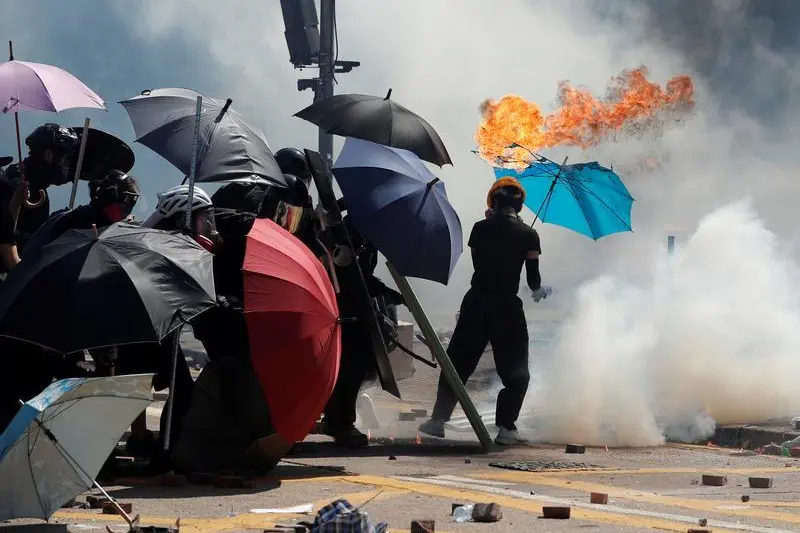PHOTO
(The opinions expressed here are those of the author, a columnist for Reuters.)
LONDON- As protests in Hong Kong approach their sixth consecutive month, those in charge of the Chinese Communist Party in Beijing may be regretting they ever took control of the territory – and particularly under a "one country, two systems" arrangement.
With riot police and student demonstrators fighting pitched battles at Hong Kong's Polytechnic University for much of the last week, it appears that the two sides are now locked in a confrontation from which neither sees a plausible exit. For many of those taking to the streets, their actions are seen as central to protecting Hong Kong's surviving civil liberties, as well as keeping open the hope of future and more democratic reform.
For those in Beijing, making such concessions would undermine much of what has held communist rule together for three quarters of a century. They want the protests over – but with the former British colony a much more open society with continuous media coverage, so far they have clearly felt there are severe limits to the brutality they can unleash.
That the authorities will get more repressive in Hong Kong does not seem in doubt. But it is striking how Beijing is taking a much more cautious approach than it has with its minority Muslim Uighurs in northwest China. Leaked documents published by the New York Times this week instructed officials on how to handle Uighur students who returned home to find that family members had disappeared into internment or "reeducation camps". The transcript of a speech by President Xi Jinping instructed officials to show "no mercy" in what the government portrays as a necessary clampdown on Islamist militancy following a string of violent attacks earlier this decade.
SPORTS KIT
Chinese rhetoric has also hardened in Hong Kong, as has use of physical force, particularly live rounds. The highly publicized use of troops in sports kit cleaning streets earlier this week appeared to be a veiled threat of a much harsher military crackdown. Still, so far the nature of Hong Kong's more open society – particularly the lack of censorship on social and other media – has left the authorities simply unable to act with the impunity they enjoy in China, particularly in its relatively remote Uighur-populated regions.
Indeed, one of the defining dynamics of the current face-off is that both the authorities and protesters know events have played out in Hong Kong hugely differently from how similar protests might have been handled in mainland China, even in the emerging high-tech megacities such as Shanghai and Shenzen. Many of those took inspiration from Hong Kong to emerge as business centres, but they lack even Hong Kong's rudimentary, heavily controlled democratic systems, while the security forces have many fewer checks on their behaviour.
The desperation of Hong Kong citizens to retain those fragile liberties – many only granted at the very end of British rule – has been at the heart of these protests since the beginning. Specifically, the prospect of Hong Kong Chief Executive Carrie Lam's proposed immigration bill allowing Hong Kong residents to be deported to the mainland was seen as so dangerous that local opposition was almost universal. While it has since been shelved, talk of Beijing's suspending local elections later this month suggests widespread expectation that China will look to find other administrative tools to tighten the screws – which may itself give activists new energy.
HIGH STAKES
For all sides, the stakes are high. Hong Kong's current "one country, two systems" arrangement is due to expire in 2047. A decade ago, many in Hong Kong and the mainland might have quietly assumed that China itself would have a more democratic character by then, but that now seems unlikely. For protesters in Hong Kong, that gives further urgency to calls for more liberalization, for some even outright independence. For China, events in Hong Kong have already damaged diplomatic efforts to regain influence and ultimately outright control in Taiwan. And while an ever more brutal crackdown unquestionably hurts Beijing's image overseas, being seen to bow to public pressure might encourage unrest on the mainland.
For all its local factors, this year's Hong Kong unrest has been part of a wider trend ranging from Chile to Lebanon, Iran, India and beyond. While most have specific triggers, behind them sits widespread frustration, particularly amongst younger generations over work, housing and wider opportunities. In previous decades such as the sixties and seventies, economic recovery and new jobs helped to blunt such spikes in protest, but it is far from clear that will happen in this economic cycle.
That is now doubly true for Hong Kong, suffering an economic downturn due to the unrest – and where student residents in particular know they may be at risk of arrest if they move to the mainland China, the only other location where they have a right to work. That may leave a situation where some feel they have nothing to lose – even as the government in Beijing worries that everything would unravel if it made even the slightest significant concession.
*** Peter Apps is a writer on international affairs, globalisation, conflict and other issues. He is the founder and executive director of the Project for Study of the 21st Century; PS21, a non-national, non-partisan, non-ideological think tank. Paralysed by a war-zone car crash in 2006, he also blogs about his disability and other topics. He was previously a reporter for Reuters and continues to be paid by Thomson Reuters. Since 2016, he has been a member of the British Army Reserve and the UK Labour Party, and is an active fundraiser for the party.
(Editing by Giles Elgood) ((giles.elgood@thomsonreuters.com))





















